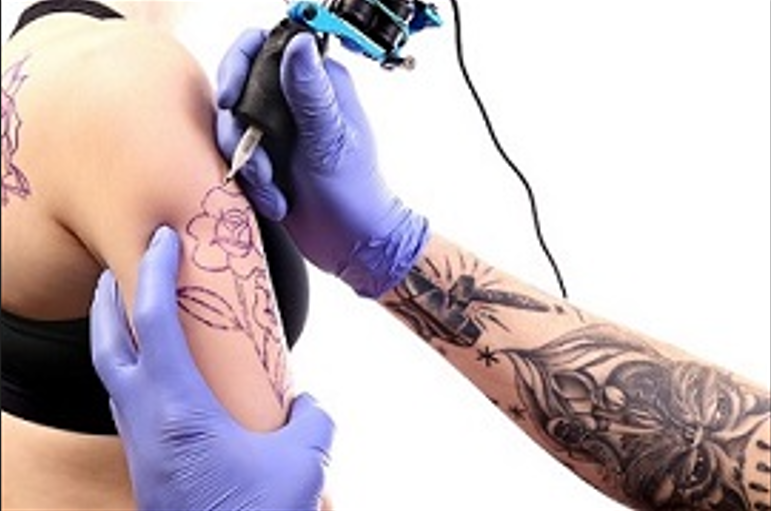
Trends come and go, but one such trend that has stayed for ages and is now getting more popular is Tattoos. Getting inked is a big decision in someone’s life. Tattoos have significant meanings for people getting them, and one has to be careful in making this decision since they are etched on your skin forever.
You will probably have a few questions before the ink meets your skin, like the pain involved, its safety, and the necessary aftercare.
Well, worry not. In this article, we have mentioned some general tips and answered some tattoo-related questions you might have.
Q. What things to consider to get a tattoo safely?
A.
-Choose a licensed studio: Get a tattoo from a licensed, reputable facility. Tattoo regulations and requirements vary by state, so check with your local health department for the latest safety laws.
-Confirm that the equipment used is new: Make sure you confirm with your artist that the needles used are brand new, as they are not to be reused.
-Make sure the artist wears gloves: Check that your artist uses a fresh pair of gloves. Each time they touch something other than you or your tattoo setup, they should remove their gloves and put on a new pair before restarting the tattoo.
-Select your tattoo ink wisely: Colored inks look attractive but carry their own risk of causing allergies. Therefore, go for black ink if you are getting a tattoo for the first time.
Q. Can I take aspirin before getting a tattoo?
A. No. Do not take aspirin before getting a tattoo since it is a blood thinner and can increase the risk of bleeding. Risk is more if you have any heart disease. If you have any heart disease and are on aspirin therapy, consult your doctor, who may advise you to stop aspirin for 1-2 days before getting the tattoo done. You may take a painkiller, like paracetamol, post-tattoo to minimize the pain.
Q. Can I donate blood after getting a tattoo?
A. As per WHO, you can donate blood only after 6 months of getting a tattoo. It is to avoid the risk of transmitting the infection to others if any.
Q. What are the side effects of getting a tattoo?
A.
Skin infections: Tattoos pierce the skin, which is the most protective organ of your body, increasing the risk of skin infections. Symptoms include redness, swelling, itchiness, and discharge. In rare cases, a tattoo can result in serious infections, like HIV, MRSA (Methicillin-resistant Staphylococcus aureus) infections, hepatitis B & C, etc. Thus, make sure that only fresh and sterilized needles are used to make the tattoo, and avoid scratching or picking the area, at least for the first two weeks.
Allergic reactions: Studies have shown that red, blue, and yellow colors cause allergies in most people. If you have a history of allergies, choose your color wisely, preferably black. Consult your doctor in case you develop an allergic reaction.
MRI complications: Tattoos might interfere with MRI results or cause side effects, like swelling, at the site even after years of getting a tattoo.
Q. Can tattoos cause cancer?
A. There are no scientific studies to prove that tattoos cause cancer, but there may be risks associated with certain ingredients in the tattoo ink. The dye inserted into your body is a foreign object which might cause unwanted side effects like inflammation. In rare cases, they might become out of control, resulting in cancer.
General tips for getting a safe tattoo:
-Select the least painful place: Pain is subjective, as every person has a different threshold for pain. However, the least painful places to get a tattoo are those with the most fat, fewest nerve endings, and thickest skin, like outer shoulders, buttocks, and calves. The most painful areas are the chest, stomach, neck, fingers, and feet. Also, bony areas usually hurt a lot.
-Avoid scratching or picking at your tattoo: Post tattooing, do not scratch the area while it heals, since this can introduce bacteria into the skin.
-Take care of your tattoo afterward: Moisturize the area with petroleum jelly or any mild unscented cream for the first few days.
-Avoid swimming: Do not swim for at least 2 weeks after getting a tattoo to avoid any reaction due to chlorine, which is present in the swimming pool water.
-No long and hot showers: A little water won’t hurt it, but avoid spending too much time in the shower, especially in hot showers, until your tattoo heals.
-Shun the sun: Avoid exposing your new tattoo to direct sunlight. Cover the area with a light bandage for at least 2-3 weeks when you step outside. You can apply sunscreen on the tattoo only after it heals completely (after 2-3 weeks).
Final thoughts
Tattoos are safe when done at the right place and properly taken care of. Though they can be a great form of personal expression, it is crucial to weigh all the potential health risks before getting inked. Consult with your doctor and conduct thorough research before you get a tattoo.
Wishing you a happy and safe inking!
(The article is written by Monalisa Deka, Senior Health Content Editor, and reviewed by Dr. Swati Mishra, Medical Editor)